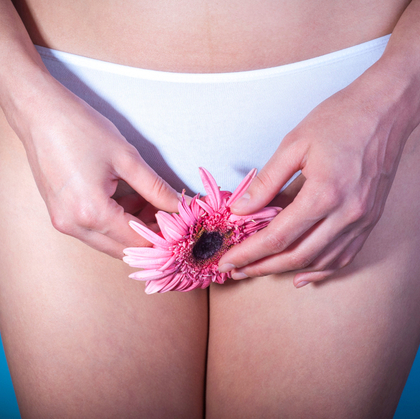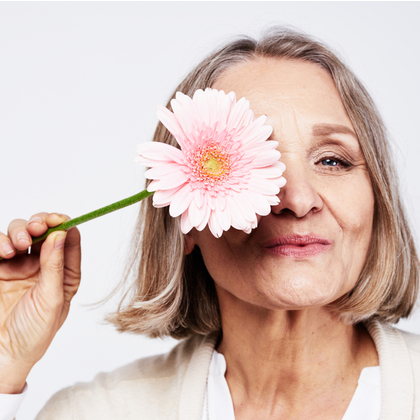
Although women can experience vaginal dryness at any age, it generally becomes more prevalent during perimenopause and postmenopause. It’s estimated that up to one in three menopausal women experience vaginal dryness (1).
Perhaps due to embarrassment or the misguided belief that this condition is a natural part of ageing, many women living with this symptom don’t get the help they need. And, unlike many perimenopausal symptoms — those experienced in the years preceding menopause, such as hot flushes, mood changes, and skin problems — vaginal dryness can worsen without treatment.
Here, we take a look at what causes vaginal dryness and outline the best possible ways to manage discomfort.
What causes vaginal dryness?
As you enter perimenopause, your oestrogen levels start to decline unevenly. This hormonal fluctuation causes a host of challenging physical and psychological symptoms, including changes to the vagina. Falling levels of oestrogen may lead to thinning of the vaginal wall, reduced blood flow and lubrication, and decreased elasticity — all of which can result in vaginal dryness (2).
 Most women reach menopause by 51 years of age (3), defined as the point where you haven’t had a menstrual bleed in 12 consecutive months. After menopause, your ovaries continue to produce negligible amounts of oestrogen, which means that vaginal discomfort can become more pronounced during postmenopause. Indeed, around 58% of postmenopausal women report vaginal pain (4).
Most women reach menopause by 51 years of age (3), defined as the point where you haven’t had a menstrual bleed in 12 consecutive months. After menopause, your ovaries continue to produce negligible amounts of oestrogen, which means that vaginal discomfort can become more pronounced during postmenopause. Indeed, around 58% of postmenopausal women report vaginal pain (4).
Besides discomfort in the pelvic and vaginal region, you may also experience (5):
-
Decreased libido
-
Burning sensation in and around your vagina
-
Pain during sexual intercourse
-
Soreness
-
Light bleeding after sex
-
Vaginal stinging or itching
-
Urinary tract infections (UTIs)
However, menopause isn’t the only factor that triggers a drop in oestrogen and, therefore, vaginal dryness. Smoking, depression, stress, childbirth, breastfeeding, rigorous exercise, and the surgical removal of the ovaries may also lead to vaginal discomfort.
How is vaginal dryness diagnosed?
We understand that you may feel embarrassed or uncomfortable about seeking medical advice on vaginal dryness. But rest assured that medical professionals are well-versed in this area and should always put you at ease.
Vaginal dryness during menopause is medically referred to as genitourinary syndrome of menopause (GSM). In order to diagnose you, your doctor may suggest the following (6):
-
Urine test – your doctor may collect and test your urine
-
Pelvic exam – your doctor may visually examine your genitalia and feel your pelvic organs
-
Acid balance test – your doctor may take a sample of vaginal fluids to test its acid balance
If your doctor isn’t sure what the cause of your symptoms are, they may refer you to a specialist or gynaecologist.
What helps with vaginal dryness?
Like many other chronic conditions, vaginal dryness has been reported to affect a woman’s self-esteem and quality of life (7). Some women, for instance, are unable to wear trousers, sit down for extended periods, or even exercise (8).
And while other menopausal symptoms, such as hot flushes or sleep problems, eventually get better with time, vaginal dryness has a chronic, progressive nature throughout perimenopause and beyond. That means that, without help, symptoms typically worsen rather than improve. Only 7% of women with vaginal dryness seek medical help (9).
However, there are many treatments available to help with vaginal dryness.
Home remedies
Before turning to medication, you may consider changing some aspects of your lifestyle to provide relief.
Drink plenty of water
To keep the mucous membranes in your vagina moist, you need to stay hydrated. The most effective way to do this is to drink around 1.5 litres of water every day. Beyond this, you may also consider avoiding — or at least reducing — your caffeine and alcohol intake since these substances are diuretics, which means that they dehydrate the body.
Avoid perfumed detergent and soaps
These products often contain harsh chemicals that strip the moisture away from the genital tissues. To support vaginal health, use non-bio washing detergent and toiletries that are specially formulated for sensitive skin.
Be wary of certain medications
Specific medications, namely those for allergies, colds, and mood disorders, are known to dehydrate mucous membranes and cause vaginal dryness. It may be an idea to discuss potential alternatives with your GP if you are taking these medications and experiencing vaginal dryness.
Try soya isoflavones
Since phytoestrogens, like soya, imitate the role of oestrogen in the body, you may benefit from supplementing your diet with the powerful plant compounds, soya isoflavones.
Hormonal treatments
In addition to lifestyle changes, you may benefit from hormone replacement therapy (HRT). Oestrogen can be taken orally to increase levels throughout the entire body, or vaginally to improve localised pain levels.
Data has shown that, in menopausal women using vaginal oestrogen therapy to reduce vaginal dryness, 58% reported less discomfort, 41% found sex more pleasurable, and 29% claimed it improved their sex life (10).
Vaginal lubricants and moisturisers
Lubricants and moisturisers are also effective at improving vaginal dryness. Water-based or oil-based lubricants are used during sexual intercourse, while moisturisers are applied regularly and at least two hours before sex.
If you are experiencing vaginal dryness, rest assured that there is help available. As well as the lifestyle changes discussed above, it’s a good idea to discuss your symptoms with your doctor, who will advise on the best route forward for you.
For more information on managing menopausal symptoms, please visit the rest of our Menopause hub.
References:
-
Canesten.co.uk. 2020. What Is Vaginal Dryness? https:#:~:text=Vaginal%20dryness%20is%20a%20common,who%20experience%20early%20menopause%20symptoms" target="_blank">https:" > Vaginal Dryness Causes. Available online: https://www.womens-health-concern.org/help-and-advice/factsheets/vaginal-dryness/
-
Sexual Advice Association. 2020. Vaginal Dryness And The Menopause - Sexual Advice Association. Available online: https://sexualadviceassociation.co.uk/vaginal-dryness-menopause/
-
Mayoclinic.org. 2020. Vaginal Atrophy - Diagnosis And Treatment - Mayo Clinic. Available online: https://www.mayoclinic.org/diseases-conditions/vaginal-atrophy/diagnosis-treatment/drc-20352294
-
Cagnacci. A, Carbone. M, Palma. F. AGATA study. Prevalence and association between objective signs and subjective symptoms of vaginal atrophy: the AGATA study. Menopause. 2016;23(10):1139-1145.
-
Pulse Today. 2020. Genitourinary Syndrome Of The Menopause. Available online: http://www.pulsetoday.co.uk/clinical/clinical-specialties/womens-health/genitourinary-syndrome-of-the-menopause/20039579.article
-
Nappi. R.E., Kokot-Kierepa M., Vaginal Health: Insights, Views & Attitudes (VIVA) – results from an international survey. Climacteric. 2012;15(1):36-44.
-
Sexual Advice Association. 2020. Vaginal Dryness And The Menopause - Sexual Advice Association. Available online: https://sexualadviceassociation.co.uk/vaginal-dryness-menopause/
Disclaimer: The information presented by Nature's Best is for informational purposes only. It is based on scientific studies (human, animal, or in vitro), clinical experience, or traditional usage as cited in each article. The results reported may not necessarily occur in all individuals. Self-treatment is not recommended for life-threatening conditions that require medical treatment under a doctor's care. For many of the conditions discussed, treatment with prescription or over the counter medication is also available. Consult your doctor, practitioner, and/or pharmacist for any health problem and before using any supplements or before making any changes in prescribed medications.
Related Posts

Olivia
Olivia Salter has always been an avid health nut. After graduating from the University of Bristol, she began working for a nutritional consultancy where she discovered her passion for all things wellness-related. There, she executed much of the company’s content marketing strategy and found her niche in health writing, publishing articles in Women’s Health, Mind Body Green, Thrive and Psychologies.
View More



